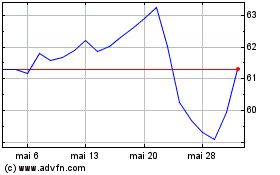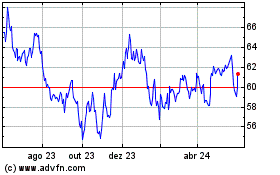Standard Register’s “Green” Efforts Surpass Its Own Expectations
19 Maio 2011 - 10:01AM
Business Wire
The Standard Register Company (NYSE: SR), a recognized leader in
management and execution of critical communications, established a
formal sustainability program in 2007, focused on reducing the
company’s environmental impact. Although the company has monitored
its progress internally, it was not aware of the overall impact
until this year when it participated in the Carbon Disclosure
Project (CDP). Standard Register scored 91 out of 100 possible
points, among the top 5% of 1,100 companies participating in the
study. The average score for participating companies was 48.
Standard Register participated in the CDP study at the request
of Bank of America, one of its largest customers, which requests
that all its major suppliers measure and report on greenhouse gas
emissions. The CDP is an independent not-for-profit organization
holding the largest database of primary corporate climate change
information in the world. According to the CDP website, thousands
of organizations from across the world’s major economies measure
and disclose their greenhouse gas emissions, water use and climate
strategies through CDP.
“Although Standard Register’s green initiatives have been a part
of our business model for some time and we’ve demonstrated a
long-term commitment to sustainability, we had never measured and
reported our carbon emissions in a rigorous, standardized way,”
said Steve McDonell, vice president of engineering. “We have found
that good sustainability practices are also good for business,
reducing manufacturing costs, reducing energy consumption and
improving safety performance.”
McDonell said Standard Register’s sustainability program
operates with one project engineer dedicated solely to advancing
the company’s environmental objectives. Each of Standard Register’s
100 facilities in the U.S. has an assigned “green team” member to
orchestrate the sustainability program. The company’s program
approaches environmental issues along three fronts: certification,
waste reduction and energy management. “Our approach is to identify
all areas of our company that have environmental impact, establish
a baseline, develop standardized processes to minimize wastes and
train local teams to implement,” he said.
Standard Register has moved from acid-based paper to alkaline,
petroleum-based inks to soy, alcohol-based fountain solutions to
synthetic and implemented a computer-to-plate technology in its
printing business. It has an extensive recycling program and every
facility monitors its trash, waste and hazardous waste practices.
An internal mailbox for “green” suggestions has been set up to
facilitate sharing of information to develop best practices, and an
internal newsletter, The Green Scene, keeps all employees up to
date on the company’s sustainability efforts.
Standard Register engaged with Delta Institute of Chicago and
Roadmap Green of Des Plaines, to catalog the greenhouse gas
emissions from its production, warehouse, distribution and sales
facilities nationwide. McDonell said the company is using the
results of the CDP study as a blueprint to enhance its
environmental programs. “Our program will continue focusing on zero
hazardous waste, lower waste to landfill, taking advantage of
waste-to-energy options when viable, energy reduction and increased
community involvement,” he said.
About Standard Register
Standard Register (NYSE:SR) is trusted by the world’s leading
companies to advance their reputations by aligning communications
with corporate standards and priorities. Providing market-specific
insights and a compelling portfolio of solutions to address the
changing business landscape in healthcare, commercial and
industrial markets, Standard Register is the recognized leader in
the management and execution of mission-critical communications.
More information is available at www.standardregister.com.
Safe Harbor Statement
This report includes forward-looking statements covered by the
Private Securities Litigation Reform Act of 1995. Because such
statements deal with future events, they are subject to various
risks and uncertainties and actual results for fiscal year 2011 and
beyond could differ materially from the Company’s current
expectations. Forward-looking statements are identified by words
such as “anticipates,” “projects,” “expects,” “plans,” “intends,”
“believes,” “estimates,” “targets,” and other similar expressions
that indicate trends and future events.
Factors that could cause the Company’s results to differ
materially from those expressed in forward-looking statements
include, without limitation, variation in demand and acceptance of
the Company’s products and services, the frequency, magnitude and
timing of paper and other raw-material-price changes, general
business and economic conditions beyond the Company’s control,
timing of the completion and integration of acquisitions, the
consequences of competitive factors in the marketplace including
the ability to attract and retain customers, results of continuous
improvement and other cost-containment strategies, and the
Company’s success in attracting and retaining key personnel. The
Company undertakes no obligation to revise or update
forward-looking statements as a result of new information since
these statements may no longer be accurate or timely.
Spire (NYSE:SR)
Gráfico Histórico do Ativo
De Jun 2024 até Jul 2024

Spire (NYSE:SR)
Gráfico Histórico do Ativo
De Jul 2023 até Jul 2024
